By Manish Khanduri
@manishkhanduri1
It's weeks into the Bharat Jodo Yatra and weariness, even exhaustion, has set in. We're in a routine of 4:30 AM wake ups, 6AM starts, 25 kilometres plus daily marches while battling heat and rain, traversing muddy lanes and national highways. The relentless physical and mental pace is taking its toll.
This 7AM morning, an hour into the walk, you don't know where you are between three neighbouring states, not exactly. Did we just cross the river Tungabhadra from Andhra Pradesh to Karnataka? Or did we cross the river Krishna from Karnataka, which we would mean we're in Telengana? Or vice versa?
You can figure it out yourself. Or, you can listen to Jairam Ramesh, Member of Parliament, as he engages the corner shop proprietor over the purchase of a bottle of Sprite and chocolates. If he's speaking Telegu, we're probably in Andhra or Telengana. If Kannada, it's Karnataka.
Later, as we sit over a delicious idli and dosa at an early, early morning breakfast at a roadside cafe, I ask him a question. "I'm not a polyglot", he replies - " I only speak English and Hindi fluently, and Kannada colloquially".
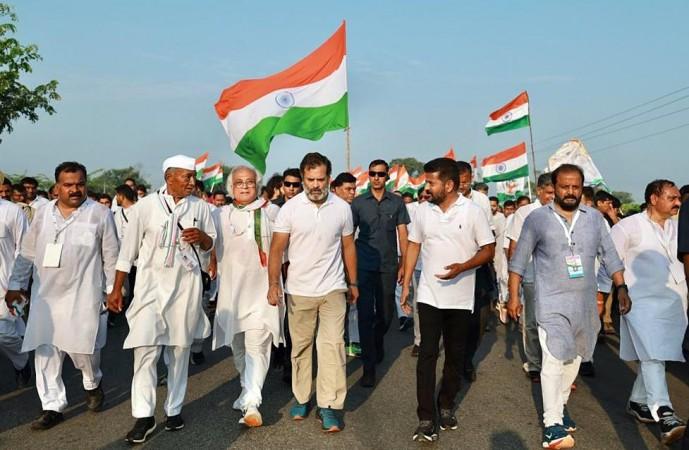
"I just have a smattering of Tamil, Malayalam, Telegu, Marathi and Bengali. I can read Gujarati but anyone can do that. It's like Hindi, so anyone who knows Hindi will be comfortable".
Wait, what?
But you're too tired to argue.
In a way Ramesh's possession of a "smattering' of languages is entirely appropriate, given the circumstances. As the recently appointed General Secretary in-charge of Communication, Publicity and Media for the Congress party, he sits on what's probably one of the hottest media and communications seats across the political landscape. Not only is he managing communications at a time when the party under considerable internal reflection post a series of electoral setbacks, he's also doing it for the Bharat Jodo Yatra.
The 3,500-kilometre 12-state walk across India, led by Rahul Gandhi is one of the most, if not the most, ambitious mass contact programs in the history of the Congress. Across geographies, cultures, and languages.
No pressure then?
"I'm like a dead man walking", he'd said in Kanyakumari, on the morning of the launch of the yatra on 7 September. He was summarising the past few months, and the hectic behind the scenes work to get the show on the road. Ramesh recalls the time he was called by then Congress President Sonia Gandhi to with the proposal that he take the role. "One thing she said stuck with me," he recalls, "that it's a 24/7 job".
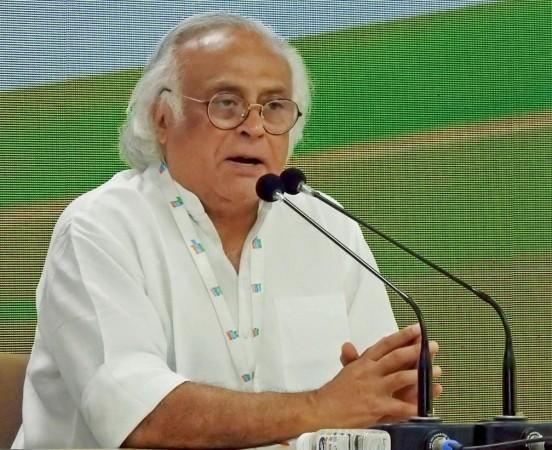
This morning at 5AM, as is the case whenever he's with the Yatra, you find Jairam Ramesh up and about, dressed in impeccable whites, hunched over his phone, catching up with and trying to get ahead of the news cycle. The communications outreach for the Bharat Jodo Yatra has been unprecedented.
As an example of what's visible on the surface, as of November 21st, since the start of the yatra Rahul Gandhi has addressed 52 corner meetings, 9 large public rallies, and 6 press conferences.
That's an intense workload by any standards. This does not include the press conferences that other national or state leaders, Ramesh included, have been conducting.
Behind the scenes
But behind the scenes he's heading an intricate and multi-layered, multi -language communications setup that starts from the contracted or in-house media teams creating live and features driven ground content every day, management of multiple distribution platforms mechanisms, his own media engagements, all the way up to directing press conferences headlined by Rahul Gandhi.
As we start the day's walk at 6AM, Ramesh ruefully observes that for a man who earlier didn't touch his cellphone between 9PM and 7AM, he's now practically chained to it, almost 24/7, as Ms Gandhi warned him.

His first tweet this day went out at 3:45AM. "I get people asking me, what the hell am I doing, up at this hour".
It's time consuming work and a lot of attention has been paid to details. For example," We chose the word 'Yatra' carefully" Ramesh says. "To evoke history and tradition". The idea of the yatra, he points out, is embedded in history. From Shankaracharya to Buddha ("a great walker, Mahavir maybe not so much"), and on to comparatively more recent examples such as Gandhiji's 1932 Salt March, or Prime Minister Chandrashekar 1983, Indian tradition has many such examples. "It's called a tirth yatra or some variation thereof in many Indian languages".
Localise the message
A couple of hours into our walk he speaks of the efforts that have gone into a critical decision -- localise the messaging by state and language. "It's not a simple exercise' he says, when you consider that the states travelled through all have their language specific theme songs, branding and content. Thus, the Bharat Jodo theme song till date has six versions- in Tamil, Malayalam, Telegu, Kannada, Marathi and Hindi, with a Punjabi version in the works.
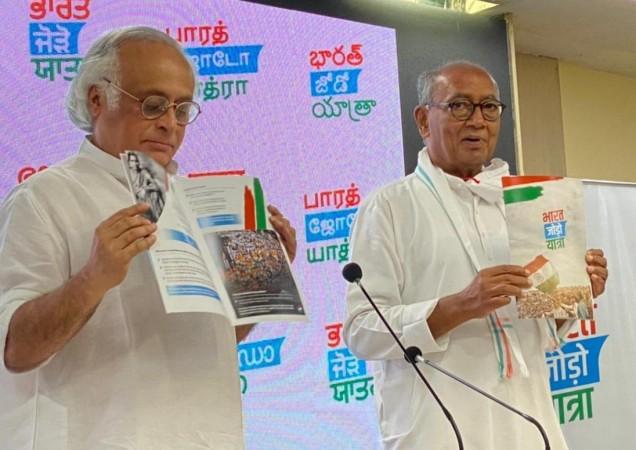
As we get to the end of our morning walk, Ramesh speaks about how it's all "happening at an unforgiving pace". Just look at his typical daily schedule. 3:30AM tweets are just a start.
Then it's catching up with, and trying to influence, the news cycle of the day. Crafting and pushing out the day's messaging to a list of key party social media influencers.
Making sure that the local language news media, a key part of the media outreach, gets "special attention".
Conducting his own media interviews – average of two in a day, but "I did 9 in Hyderabad the other day".
Preparing for a general press conference at 11AM. Which could be by himself, along with state leaders, or headlined by Rahul Gandhi.
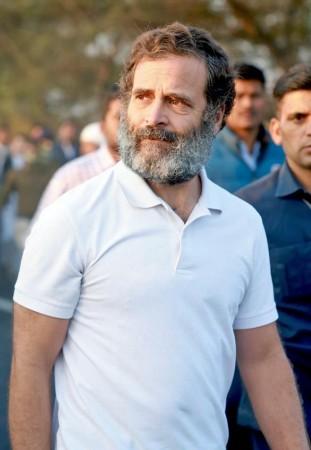
A Rahul Gandhi-led interaction with any of a wide range of farmer, or labour, or civil rights, or transgender, or tribal or minority groups at 2.30PM.
After for the press conference and the interaction, rinse and repeat for the evening cycle.
This relentless schedule does not include the daily media planning and outreach for national issues, which takes as much as three hours of his day.
Not to forget that he usually accompanies the Bharat Yatris on foot during the 6AM-9AM, 10-16 kilometre, morning sessions, when "it's quieter and I can focus on just walking".
"Nothing can really prepare you for this", he says, "Nothing".
Overcoming scepticism
It's now 1 PM and Jairam Ramesh is conducting a press conference. He has to navigate questions that could vary from querying the concept, efficacy or success of the yatra to Rahul Gandhi's daily schedule.
There's scepticism - the Congress party has lost two successive national elections in a row, in 2014 and 2019. In 2022 it failed to form a government after contesting elections in five states, in Punjab, Uttar Pradesh, Uttarakhand, Goa and Manipur.
He goes to work. He emphasizes simple, repeatable, memorable insights. "The Bharat Jodo Yatra's goal is to combat three problems. Problem number one, increasing economic inequality. Two, increasing social polarisation. Three, political dictatorship and authoritarianism".
And second is his consistent use of data to set context. For example, "Today is fiftieth day of the Bharat Jodo yatra. We have walked about 12 km. Since the beginning we had covered 2 districts in Tamil Nadu, 7 in Kerala, 7 in Karnataka and 2 in Andhra, making it 18 so far. In the 11.5 days left in Telangana we will cover 8 more districts making it 26".
Later in the afternoon, he could be involved in directing a closed door, off media, interaction of a wide range of social, cultural or and political with Rahul Gandhi. In one of them he launches into a short history of the Devdasi tradition and its transformation in the 20th century, including Bharat Ratna awardee singer MS Subbulakshmi's devdasi roots. In another interaction he is giving an off the cuff lecture on tribal rights and the impact of forest laws.
Daily routine
Through this daily routine, that is frenzied, cacophonous, and often unscripted, you sense that the man strives to find a quiet space. By now it's late in the evening and we are sitting in a corner shop in Raichur. He's just finished leaning out the car window and haranguing the neighbourhood shops for "Polo! Polo? You have Polo?". As Ramesh steps out to make his purchase, Hashim, the driver of his vehicle, puts in his own request, sotto voce. "Can he buy me a bar of chocolate?". He can, and does.
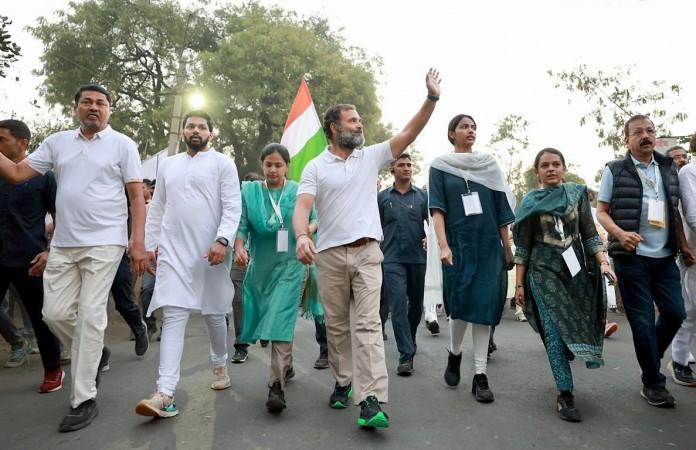
We are kilometres away from what is probably one of the largest public rallies in the yatra in a while - current unofficial crowd counts stretch from fifty thousand on up. Anyone who's someone in the Congress party is probably up there on the main stage, basking in the adulation and of course the gaze of multiple television cameras. It's a politician's dream - a shower of immediate, live, publicity with later chances of a deluge of national exposure.
Not on the centre stage
And yet Jairam Ramesh sits mostly by himself, looking into his phone, sipping on a Lime Mint cooler, soon to be followed by a Pista Shake. Occasionally a group of bashful youth, or policemen come by for a selfie, but that's about it. Why is he here and not on the stage?
He looks up and across at me. "It's a trade-off, over here I can continue to do my job, up there it's an entire afternoon and evening gone". Immerses himself back into his phone. And that's the end of that.
It's already a 14 hour day and now we're driving back to the evening campsite. Everyone's dead tired. Seemingly out of nowhere Ramesh notices the massive Bharat Jodo Yatra banners lining a town crossroad, plastered with what looks like a dozen or more photographs of national or state leaders.
"Why do they need to have so many photographs", he asks. He's referring to the propensity of local politicians to plaster mugshots of prominent state or national leaders on their displays.
Why not just focus on the yatra messaging, he seems to imply, instead of catering to the egos of a few grandee politicians?
"But sir", says an aide, mischievously, "Your picture is in there too!"
A split second's silence, then the two-time central minister, five times Member of Parliament and eight times author leads the long, tired burst of laughter that ensues. Another day in the yatra is coming to a close.
[DISCLAIMER: The views expressed are author's personal and do not reflect the policy or views of the IB Times, India.]

















